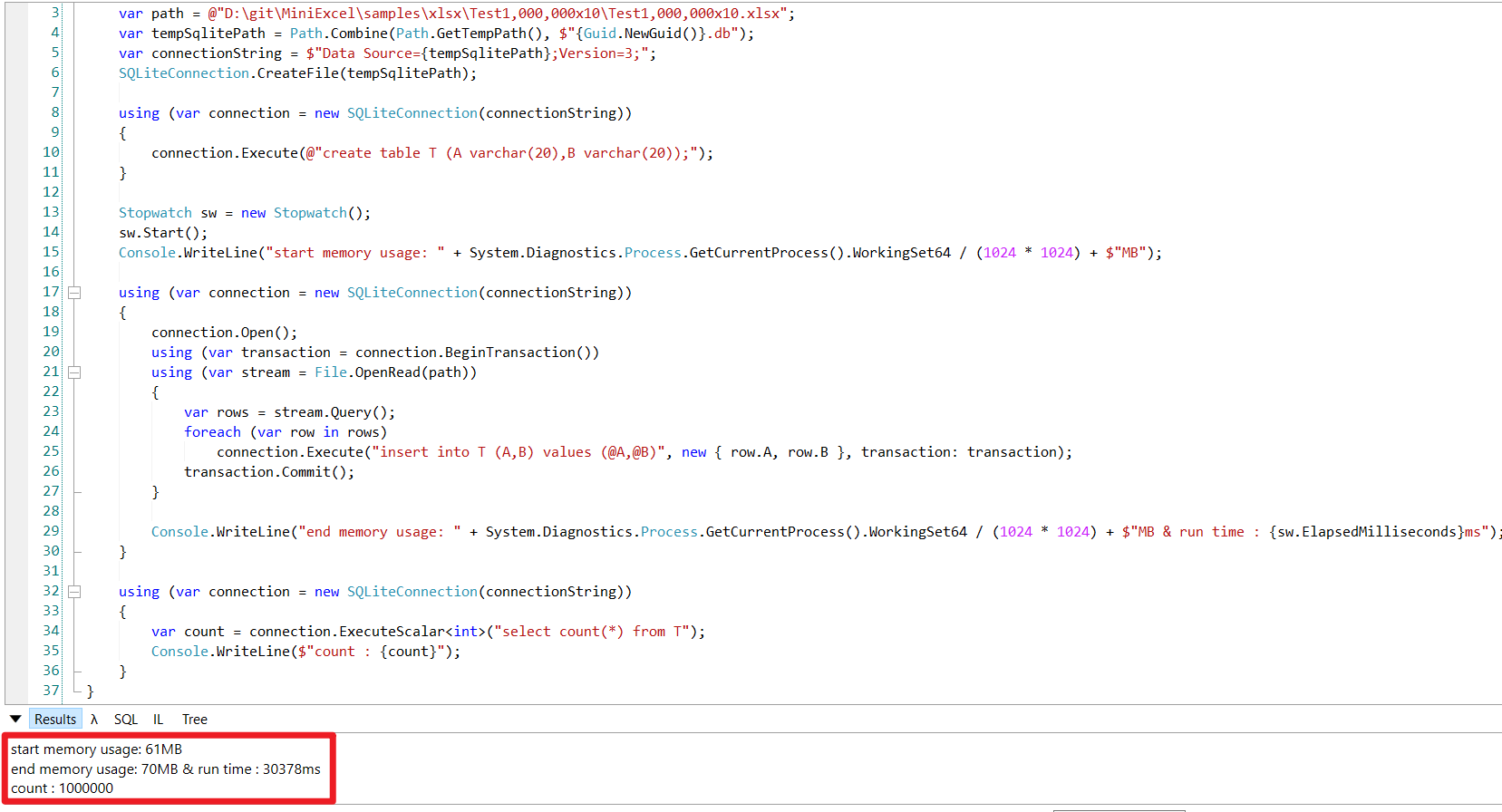| benchmarks/MiniExcel.Benchmarks | ||
| docs | ||
| drafts | ||
| samples | ||
| src | ||
| tests | ||
| .gitattributes | ||
| .gitignore | ||
| appveyor.yml | ||
| LICENSE.md | ||
| README.md | ||
A high performance and easy Excel(xlsx,csv) Micro-Helper that avoids OOM and without any third party dependencies to create file or dynamic/type mapping query etc..
Features
- Avoid large file OOM(out of memoery) by IEnumerable Lazy loading
step by step getting one row cellsnot until all rows read in memory
e.g: Comparison between MiniExcel Query and ExcelDataReader/EPPlus/ClosedXml of reading large Xlsx File
- Mini (Less than 100KB) and without any third party library dependencies
- Like Dapper dynamic/type mapping query style
- Create excel file or stream by AnonymousType/DapperRows/Enumrable/DataTable/Dictionary
Installation
You can install the package from NuGet
Release Notes
Please Check Release Notes
Execute a query and map the results to a strongly typed IEnumerable [Try it]
Recommand to use Stream.Query because of better efficiency.
public class UserAccount
{
public Guid ID { get; set; }
public string Name { get; set; }
public DateTime BoD { get; set; }
public int Age { get; set; }
public bool VIP { get; set; }
public decimal Points { get; set; }
}
var rows = MiniExcel.Query<UserAccount>(path);
// or
using (var stream = File.OpenRead(path))
var rows = stream.Query<UserAccount>();
Execute a query and map it to a list of dynamic objects without using head [Try it]
- dynamic key is
A.B.C.D..
| MiniExcel | 1 |
|---|---|
| Github | 2 |
var rows = MiniExcel.Query(path).ToList();
// or
using (var stream = File.OpenRead(path))
{
var rows = stream.Query().ToList();
Assert.Equal("MiniExcel", rows[0].A);
Assert.Equal(1, rows[0].B);
Assert.Equal("Github", rows[1].A);
Assert.Equal(2, rows[1].B);
}
Execute a query with first header row [Try it]
| Column1 | Column2 |
|---|---|
| MiniExcel | 1 |
| Github | 2 |
var rows = MiniExcel.Query(useHeaderRow:true).ToList();
// or
using (var stream = File.OpenRead(path))
{
var rows = stream.Query(useHeaderRow:true).ToList();
Assert.Equal("MiniExcel", rows[0].Column1);
Assert.Equal(1, rows[0].Column2);
Assert.Equal("Github", rows[1].Column1);
Assert.Equal(2, rows[1].Column2);
}
Query Support LINQ Extension First/Take/Skip ...etc
Query First
var row = MiniExcel.Query(path).First();
Assert.Equal("HelloWorld", row.A);
// or
using (var stream = File.OpenRead(path))
{
var row = stream.Query().First();
Assert.Equal("HelloWorld", row.A);
}
Performance between MiniExcel/ExcelDataReader/ClosedXML/EPPlus

Create Excel file [Try it]
Note : Must be a non-abstract type with a public parameterless constructor .
Anonymous or strongly type:
var path = Path.Combine(Path.GetTempPath(), $"{Guid.NewGuid()}.xlsx");
MiniExcel.SaveAs(path, new[] {
new { Column1 = "MiniExcel", Column2 = 1 },
new { Column1 = "Github", Column2 = 2}
});
Datatable:
var path = Path.Combine(Path.GetTempPath(), $"{Guid.NewGuid()}.xlsx");
var table = new DataTable();
{
table.Columns.Add("Column1", typeof(string));
table.Columns.Add("Column2", typeof(decimal));
table.Rows.Add("MiniExcel", 1);
table.Rows.Add("Github", 2);
}
MiniExcel.SaveAs(path, table);
Dapper:
using (var connection = GetConnection(connectionString))
{
var rows = connection.Query(@"select 'MiniExcel' as Column1,1 as Column2 union all select 'Github',2");
MiniExcel.SaveAs(path, rows);
}
IEnumerable<IDictionary<string, object>>
var values = new List<Dictionary<string, object>>()
{
new Dictionary<string,object>{{ "Column1", "MiniExcel" }, { "Column2", 1 } },
new Dictionary<string,object>{{ "Column1", "Github" }, { "Column2", 2 } }
};
MiniExcel.SaveAs(path, values);
Create File Result :
| Column1 | Column2 |
|---|---|
| MiniExcel | 1 |
| Github | 2 |
SaveAs Stream [Try it]
using (var stream = File.Create(path))
{
stream.SaveAs(values);
}
SQLite & Dapper Large Size File SQL Insert Avoid OOM (out of memory)
using (var connection = new SQLiteConnection(connectionString))
{
connection.Open();
using (var transaction = connection.BeginTransaction())
using (var stream = File.OpenRead(path))
{
var rows = stream.Query();
foreach (var row in rows)
connection.Execute("insert into T (A,B) values (@A,@B)", new { row.A, row.B }, transaction: transaction);
transaction.Commit();
}
}
ASP.NET Core 3.1 or MVC 5 Download Excel Xlsx API Demo
public class ExcelController : Controller
{
public IActionResult Download()
{
var values = new[] {
new { Column1 = "MiniExcel", Column2 = 1 },
new { Column1 = "Github", Column2 = 2}
};
var stream = new MemoryStream();
stream.SaveAs(values);
return File(stream,
"application/vnd.openxmlformats-officedocument.spreadsheetml.sheet",
"demo.xlsx");
}
}
Excel Type Auto Check
Default system will auto check file path or stream is from xlsx or csv, but if you need to specify type, it can use excelType parameter.
stream.SaveAs(excelType:ExcelType.CSV);
//or
stream.SaveAs(excelType:ExcelType.XLSX);
//or
stream.Query(excelType:ExcelType.CSV);
//or
stream.Query(excelType:ExcelType.XLSX);
Important Note
MiniExcel support parameter IEnumerable lazy loading, If you want to use least memory, please do not call methods such as ToList
e.g : ToList or not memory usage

TODO
Please Check Project · todo
Limitations and caveats
- Same column name use last right one






